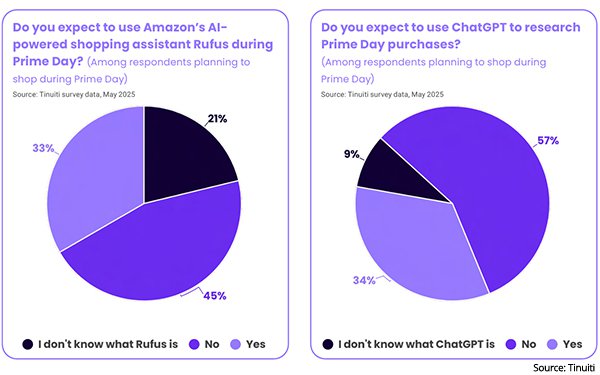
Artificial intelligence (AI) will become the tool to
search for the best deals ahead of Amazon Prime Day in mid-July.
The marketplace will extend shopping days from two to four, but tariffs will have a major impact on the amount consumers
spend.
Tinuiti's 2025 Prime Day Study, which analyzes consumer shopping behavior, shows an increase in shopping interest tied to Amazon’s extended Prime Day event.
AI-based tools have become the best option to explore products. Thirty-four percent of respondents participating in the study plan to shop during Prime Day say they will use ChatGPT to research
purchases, slightly outpacing the 33% who say they expect to use Amazon’s AI-powered shopping assistant Rufus during the sale.
Over two-thirds of 2025 Prime Day shoppers expect to begin
researching Prime Day deals at least two days before the event, and 29% intend to start evaluating products more than a week before Prime Day.
advertisement
advertisement
Eighty percent of Prime members surveyed expect
to shop the event this year, up from 68% in 2024. Among returning Prime Day shoppers, 41% plan to spend more than they did last year, compared with 15% who plan to spend less, according to
Tinuiti’s study.
Among those who shopped on Amazon during Prime Day 2024 and expect to do the same this year, 41% intend to spend more, compared to just 15% who say they’ll spend
less. For Gen Z, the rate expecting to spend more jumps to 60%, with just 11% intending to spend less.
Some 36% of Prime Day shoppers said they want to see bigger discounts to cover tariffs,
whereas 32% plan to stock up on products they think will become more expensive later this year.
As to what constitutes a large discount, 93% of 2025 Prime Day shoppers say that Prime Day
products need to be discounted by at least 20% to be considered a good deal, with 16% saying they believe that products need to be at least half off to be a good deal.
As of May 28, 2025, U.S.
government receipts for "Customs and Certain Excise Taxes" topped $22.3 billion in May. This reflects the impact of tariffs -- including those that went into effect on April 5, alongside
other duties. This figure is likely to see only a slight increase in the coming days, as a large portion of tariff duties are often paid on one day, according to a report.
When asked to describe how tariffs and inflation affect advertisers based on Tinuiti's study on shifting shopper priorities, Andy Taylor, vice president of research at Tinuiti, said: "In the
aggregate, Q2 advertising spend is largely tracking in line with where we would expect it to be even without tariffs, and same-store spend on key platforms like Amazon, Google, and Meta continues
to grow year-over-year for Tinuiti advertisers.”
The big question, Taylor said, is whether consumer demand will hold up later on in the year -- "when some product prices could
rise, and the extent to which that might harm advertiser performance.”
The survey results make it clear that Prime Day remains a strong opportunity to purchase products
that might be more expensive outside of these key sales days for consumers. The price for these products also could rise later in the year. In that case, advertisers should remain ready to meet that
demand, he said.
A recurring theme during the years has been Amazon advertisers steadily becoming more aggressive in the lead-up to Prime Day to grow awareness ahead of the event.
Amazon’s demand-side platform (DSP) stands out in particular as a tool for getting in front of shoppers early, and brands typically start ramping up investment in the DSP about two weeks
prior to Prime Day, Taylor added.
During Prime Day, shoppers are expected to search for deals across Walmart, Target, Shein, and Temu in addition to Amazon. More than half say they will check
Walmart, and nearly one in five plan to browse Shein despite tariff-driven price increases.
Gen Z is especially likely to comparison shop across multiple platforms.
More than
one-quarter of shoppers will use Amazon Prime Day to get a head start on holiday shopping, and 65% say it is a better opportunity than Black Friday or Cyber Monday.